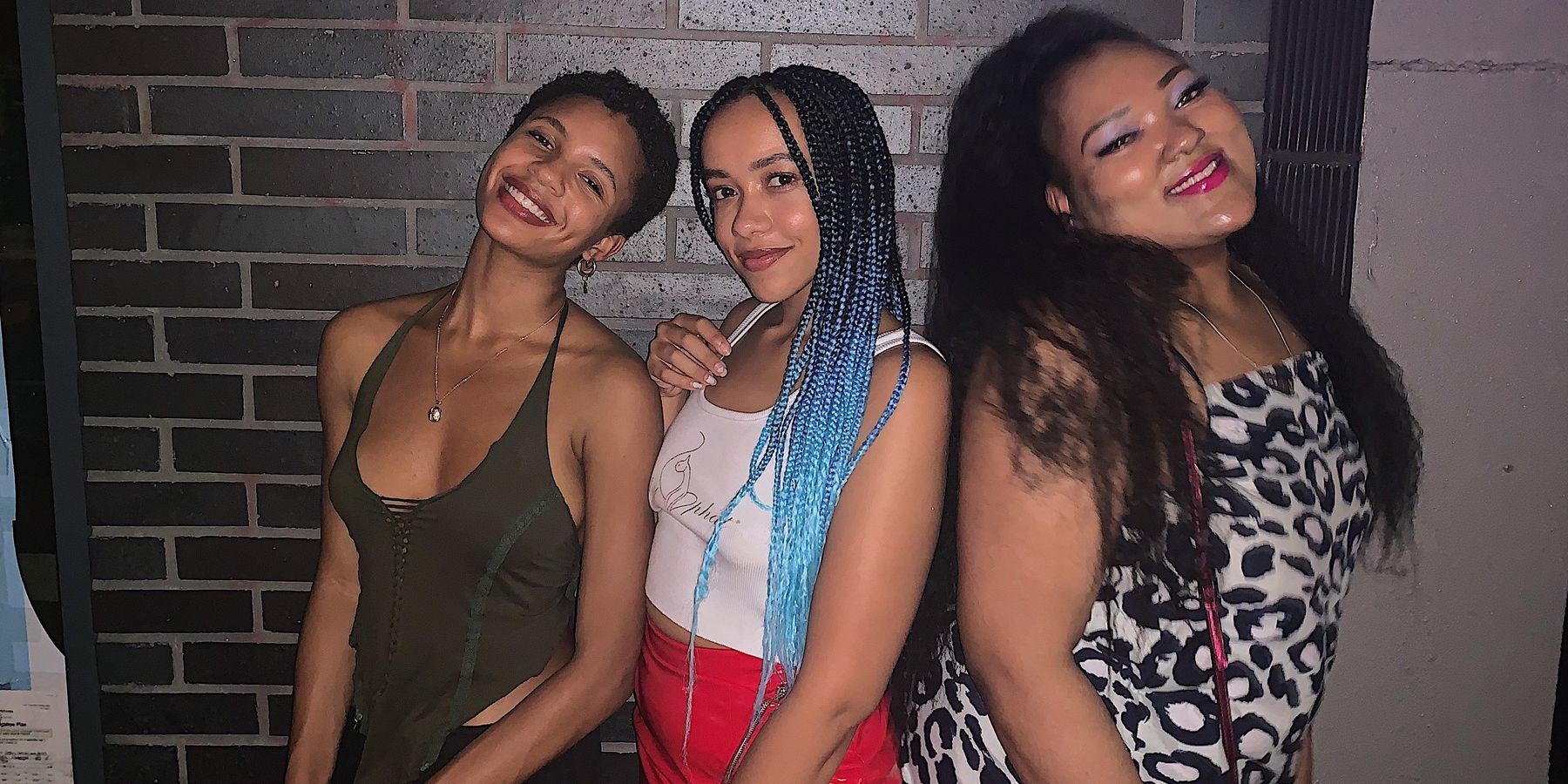
Nightlife
SISTASPIN Is Making NYC Nightlife More Black, Femme and Queer
by Jonathan Chau
09 August 2019

There aren't many parties like SISTASPIN's in New York City. The floor riddles from the intricate mixes of sensual R&B, house beats, and powerful upcoming female rappers, not the same old Top 100 dance tracks. People sway their hips to the rhythm, feeling the music and living their best lives. The dimly-lit room is filled with a diverse group of people, yet there's an overwhelming majority: Black women and femmes.
This is true for all SISTASPIN's parties. It's a space created specifically for Black and Brown women, femmes, and LGBTQ+ people to feel comfortable when going out. As a collective and organization, SISTASPIN is dedicated to elevating DJs, producers, and musicians of those specific identities in an otherwise white male-driven industry.
Currently led by Jody Simms, Mái Kayegi, and Ashby Bland, a trio who originally met in college at Columbia and Barnard. Simms remembers first going to university and being inspired when seeing a Black girl DJing for the first time. "I was like, 'This girl is so cool. I want to be her. I wish there were more femmes, more women DJing like that,'" she says.
By the time they were upperclassmen, Simms and Kayegi began an on-campus radio show, called MADTINGSADTING, where they played bangers from the likes of Rico Nasty and Ms. Bank, putting people on to the music they were obsessed with.
Eventually, Simms went on to tour internationally with Junglepussy after befriending her at a concert. There she met European collectives like Pussy Palace and BORN N BREAD, and felt that presence was missing in New York. That's when she decided to make a Facebook page to connect with other DJs and creatives (which was at that point called Sisters Spin, not SISTASPIN).
Meanwhile, Bland was a freshman and virtual DJ, doing small gigs on campus and met Simms in a photography class they had together. As the only two Black girls in the class, they connected. SISTASPIN went on to have their launch event on January 2018 at Chinatown Soup, where Bland took the pictures.
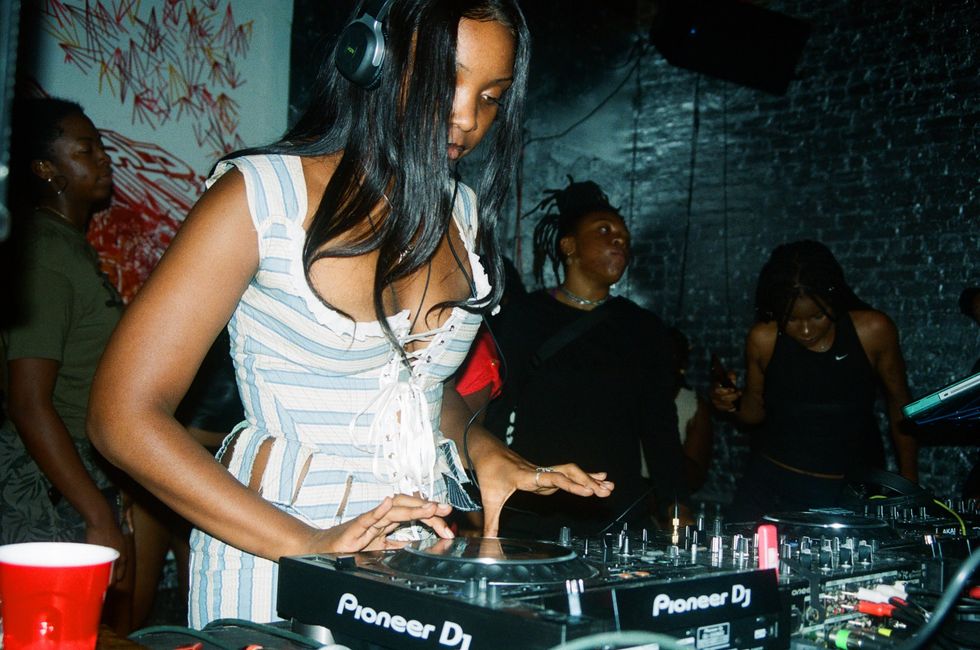
SISTASPIN continues to do events and parties all over Manhattan and Brooklyn. Whether it was their residency at Elsewhere, SISTAPANEL at the Ludlow House, or historic Boiler Room set last month, they are formulating a narrative that has been left unnoticed in the mainstream and pushing it to the forefront.
PAPER had to chance to talk to the creatives over brunch at Short Stories, a venue that allowed them to hold their own nights and where Kayegi and Bland first performed on a CDJ. The trio spoke to us about their SPIN SCHOOL workshops, why community is paramount, and the possibility of global expansion.
Why did y'all decide to create SISTASPIN? Why did y'all feel like this was something that was needed?
Mái Kayegi: We would go to things in the city and be like, "This feels close to, but not quite what I want it to be." And if we want it to be what we want, we can just do that.
Ashby Bland: Now that I go to a SISTASPIN party, it's exactly what I want every time. It's a gamble going out in New York City. Sometimes I'll hear music that I don't fuck with and I'd want to leave. While I was photographing, I always wanted to go because I knew it was going to be lit. All of my friends would go no matter what because they knew the music would be good. That's why I had a lot of faith in it. People there are chill. We're going to see all types of people. It's going to be a very diverse crowd that was free to wear whatever. There's no judgment.
Jody Simms: You know what's funny? A guy came up to me at a party and was like, "We felt SISTASPIN was anti-men." [laughs] The thing is that's not what it is, but it's good that they recognize that it's not a space that's geared towards them.
Kayegi: I had a conversation about that the other day. There's this guy that wanted to go to an event at NO BAR. I was like, "This is a space that you can be in, but this is not your space."
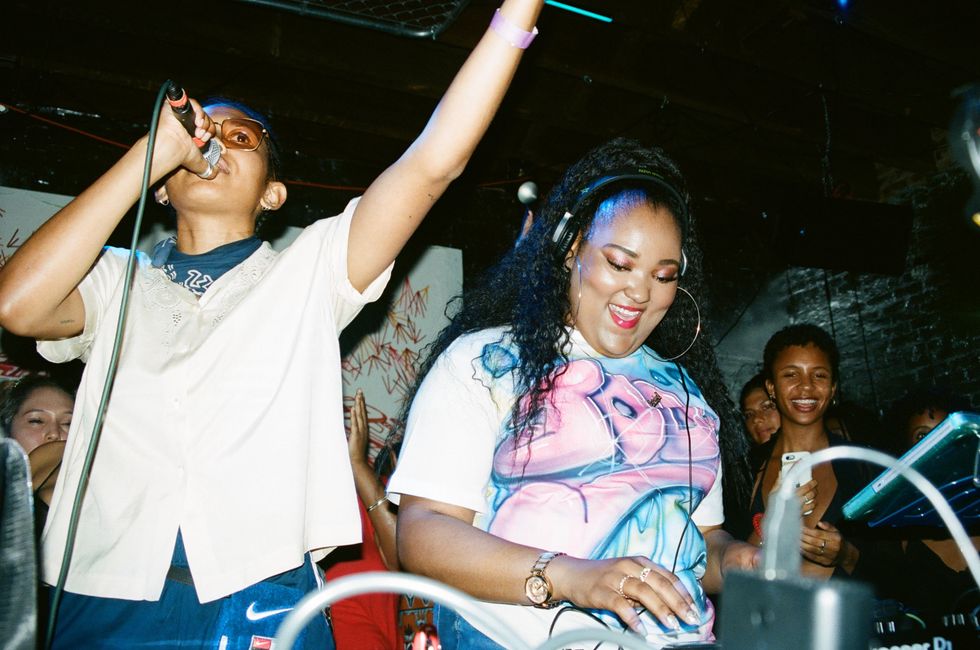
Simms: There is a way to exist in a space without taking up that space.
Exactly. You can exist, but not take it from people this space is meant for.
Bland: It's about making people like us comfortable in that space. Every time I went to a SISTASPIN party, I knew that I would feel so free.
Simms: That's also why we started to do a DJ workshop called SPIN SCHOOL. The first one last spring was in Brooklyn, and it was based on POWRPLNT. We had Dime, who DJs for us a lot, lead the class. She was the professor for the school. We thought, "Why don't we have vinyl as our first workshop, because that's something is so rare." It's something that people are afraid of but still want to learn about.
Kayegi: Something that people talk about wanting to do, but never have and are not doing because there's a lot to figure out.
Simms: So how about we have a class and teach vinyl and we have the teacher be a Black woman. Black women, Black femmes, and Black queer people are there seeing someone that has similar identities to them that looks like them, teaching them how to do something, and making them feel like it not something just for a man, not something that's inaccessible, but something within reach.
Kayegi: Removing that aura that 'someone like me can't do it.'
Simms: It's fear, it's that aura that Mài said: the idea that it's not for you, because we can do whatever we want. Then I was on Facebook and saw a form for a Tommy Hilfiger pop-up launch. It was a form that you submitted to do a workshop or class with them at their 5th Avenue store. So, I submitted SISTASPIN with our bio and everything, and they hit us up back. It was crazy. So, we did a SPIN SCHOOL at Tommy with CDJs.
Kayegi: That was the genesis.
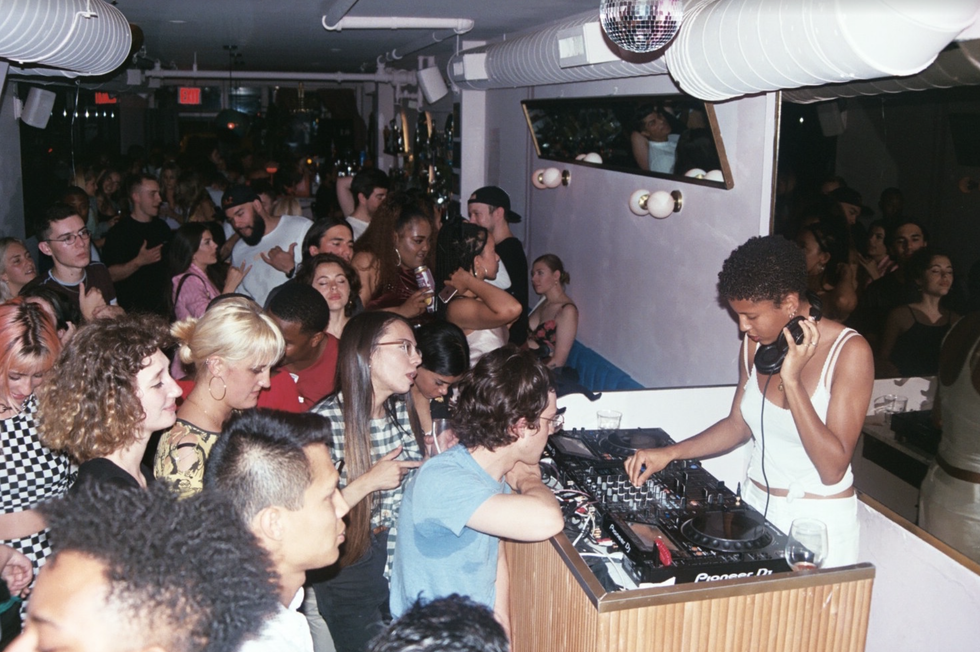
How important is that you're are a collective, a community, and based around those identities?
Bland: The talent is more than just us. If you want to have a good event, if you want to create a relationship, if you want to have people learn things, you have to reach far beyond yourself as well as small groups of people. There's just way more talent if you're looking for it.
Simms: We're SISTASPIN and it's a collective, but it's also an organization. That's what we're working on. We're working on ways to embrace and incorporate our community and bringing them into SISTASPIN.
That's what's so great about SISTASPIN. Your identities are placed as a main focal point.
Simms: That's why we focus on putting Black femmes on the lineup and make them the focus of every single thing we do.
Kayegi: The reason why we don't have a lot of money as an organization is because we believe in paying our DJs and we don't keep the money. If you have an event and we get paid from the venue, the money is going to the DJs. If we DJ at something, more often than not, we're not paying ourselves. What we're trying to do is put money into people's pocket and telling people, "You can do this." While it is being creative, people need money and need to get paid. We would rather not have people being exploited by some random person when they're trying to make it in this industry and don't know how much money they should be making.
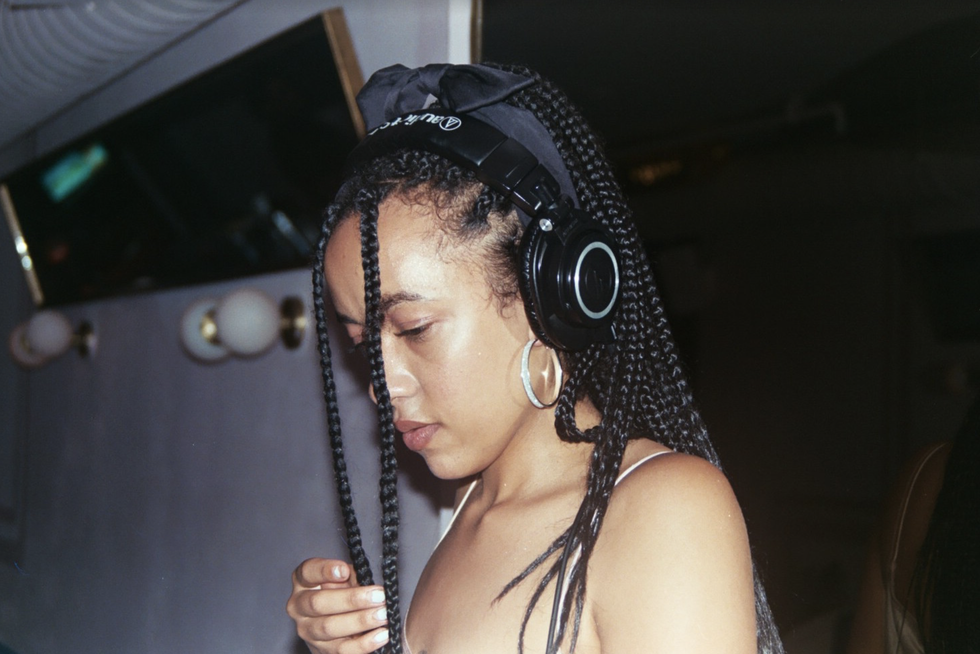
Simms: I always want to make sure at a SISTASPIN party that people are doing what they need to do, not just in terms of DJing, but they're having fun. We'll always make sure that people have their drinks if that's what they want to do. Everything they need to get lit, have fun, and be there.
Kayegi: Obviously things are heavy right now for a lot of people, and having space that makes it a little easier is absolutely imperative for people to continue to survive. Things like immigration are things that we are aware of. We want to say, "It's okay. It's going to be alright. Come and have a good time."
Simms: I always want to make sure that all shades of Black women, all shades of Black femmes are represented. At times, I see things and I see a certain type of Black girl on the forefront of everything. I wanted the diversity of Black women to be represented and shown, and put on a platform and elevated. I want everyone to know, "You're great at this just the way you are. You can do this. Your art means something."
Kayegi: Sometimes it's just as simple as seeing people do it.
Empowerment seems very important to SISTASPIN as a collective.
Simms: For me, that's been a focal point of my whole life. I was the president of the Empowering Young Women Society in high school. I went to a women's college. That's literally what I lived and breathed. I grew up with a single mom. All I've ever seen are strong Black women. That's what I want to continue to see. So, for DJ and production, that's what we want to see. That's why we love Rihanna. [laughs].
Bland: Empowerment is important to me because I've done a lot of things in my life. I was a competitive tennis player. I make art. I write. Now I'm DJing. I take photos. A lot of different things. When I was young growing up in spaces, I didn't see people like me represented. I'm from Florida. I've lived in the South for a good part of my life. There's a lot of personal discovery that a person like that has to go through to be able to cope. When I was 17 years old, I was just coming into myself, realizing that I'm worthy. If I can do that for any person or many people for the rest of my life that would be the best thing. Empowering other people is just so fun. Showing people that they're worth it and that what they're doing is meaningful. Shit is tough. A lot of people tell you can't do things.
Kayegi: When I came to New York, I had a different idea of what I wanted to do. I came here to do economics, finance, that kind of stuff. I feel like that's what was going to make me feel like I was fulfilled. That I have money and can take care of myself. I was alienated from that whole experience when trying to do that.
Simms: But no one can take your creativity away from you. No one can take your artistry away from you.
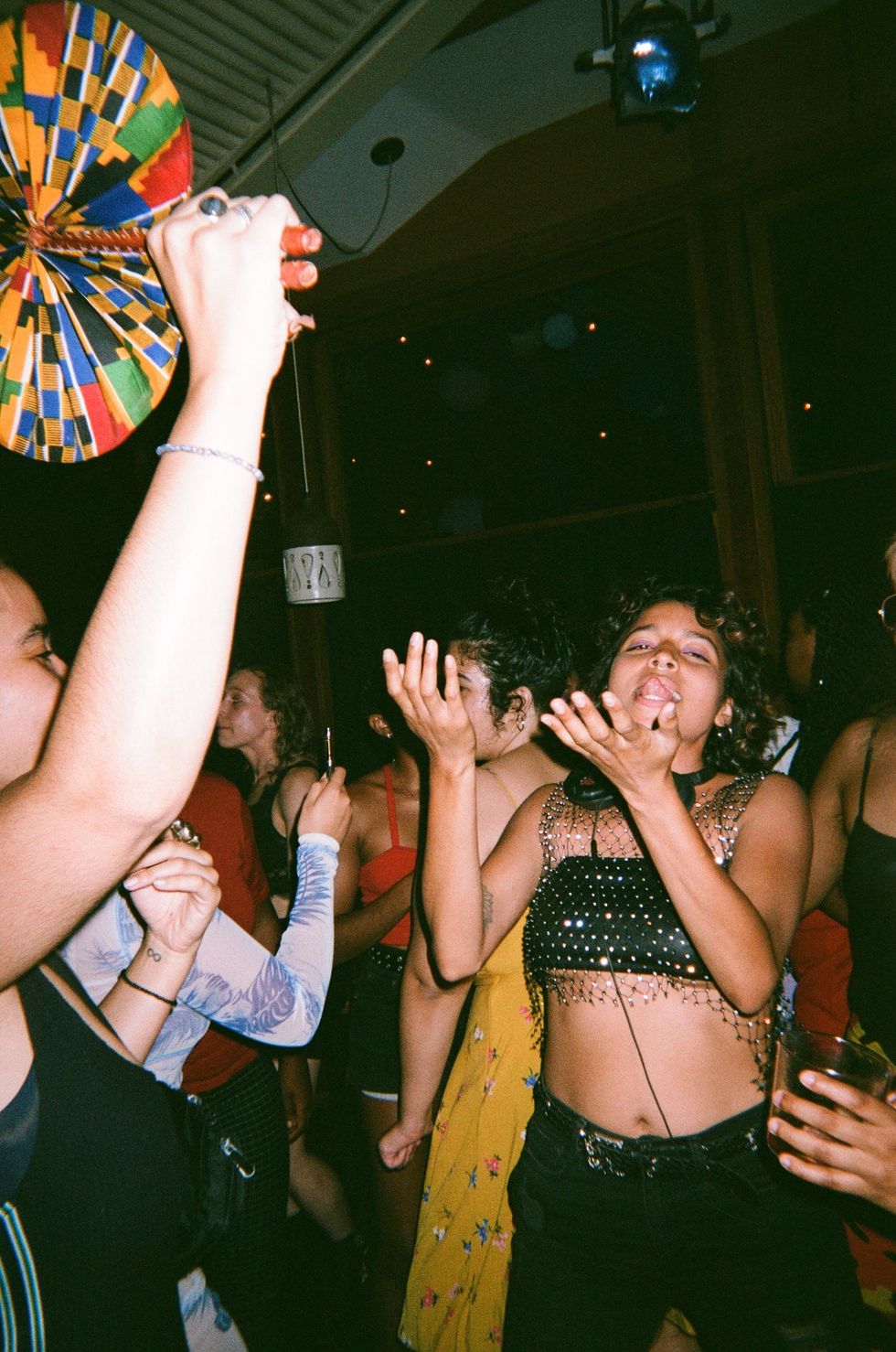
Kayegi: It wasn't giving me the feeling of contentment or security in myself that I was searching for. I don't know why I thought finance was going to give me that. [laughs] For empowerment, it is about being able to see what you want to do for yourself and your community. If you have the space and that space feels open enough for you to take that first step and you get a taste of what that feels like, it becomes very addictive.
Simms: I see music as a form of therapy in how happy a lot of the DJs that DJ with us for the first time are. How happy people are to put their hands on a disk, a vinyl. It brings happiness and self-confidence to do that. With music, you're creating a brand. You're putting yourself out there.
Kayegi: It's quite a vulnerable position to be in. To have a space where that vulnerability is honored [is important].
Simms: That's why we always tell DJs, "Whatever you guys need from us to make this night your night. If you want your laptop, if you want to use your iPad, that's a start. It's a no-judgment zone and you can do that. Whatever makes you comfortable to start that journey. We want to help and we want to support that."
Kayegi: Personally, I didn't have the confidence in myself to go out there and be like, "Okay, I want to go DJ. I'm going to whatever event in New York and I'm going to be the DJ here."
Simms: It's also getting the confidence within ourselves. We're emailing people. We're like, "Hey, my name is Jody. I'm with SISTASPIN, can we start something?" They don't have to let us do anything. They don't know me.
Bland: But it's about people giving us the chance to say yes.
Kayegi: We're doing things. But we don't have a lot of power. We don't have spaces. If you down to do something with us, we love that.
Simms: That's that confidence through music and SISTASPIN.
Kayegi: We're able to a Boiler Room and put a lineup of all Black girls on there.
Simms: We have DJs everywhere that are like, "I want to play a SISTASPIN event. I want to do SISTASPIN." People have messaged us from New Orleans, LA, Miami. Everywhere.
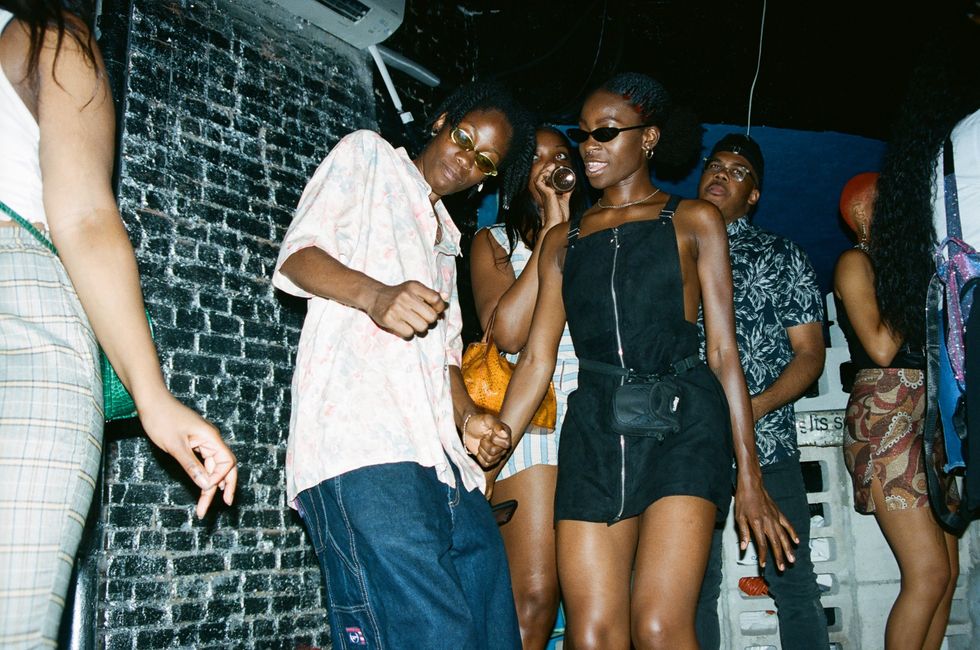
Kayegi: The number one challenge is money. We're in the space where we're excited and other people are excited.
Simms: But we do need help because this is getting a little too much.
Kayegi: There's such an appetite for this kind of thing, and it's only three girls who are doing it.
Bland: We're doing everything. We're working 24 hours a day, 7 days a week. I have work. I have three other jobs. I'm working while I'm working at work. And I've always been a creative person. My parents are business-minded. I've been surrounded by business. I've always had so many people around me telling me how difficult it is to be creative and make good money. I just wanted to say that I think it's possible. SISTASPIN is showing me that it's possible. I think a lot of it comes from creativity, communication, and relationships. We're literally helping people, having a good time, paying people, and making money. Well, not making money. But making money for other people.
I wanted to talk a little about reclaiming spaces, especially when white, male DJs are the norm.
Simms: And they suck. [laughs]
Not just that, [laughs] but a lot of scenes in the past have started by people of color, femmes, and queer people. Then, they become appropriated for the mainstream. Why is it important for people who look like y'all and are y'all to be at the forefront?
Bland: It's important because you want to have a better time. The party is just better.
Kayegi: We're not worried about those guys. We're not worried about what they're doing. We're not worried about their spaces. We're making our own thing.
Bland: They can do their thing. It's working for them.
Kayegi: It's not something we constantly think about. It's about creating opposition to that for ourselves.
Bland: And playing music that I'm trying to dance to and reminds me of my family from the Islands. It's mad personal. Black DJs play music that I can relate to more, because that's my culture and where I grew up.
Simms: For me, I'm just Black American. My family is from Texas and Louisiana. Music gives me the sense that my Blackness is validated. Being Black in America, it's your home base, but it doesn't feel like it because they're always fighting against us. With music, I play Black women rappers and a lot of them are from the South. It's my culture. It's my Blackness. Yes, Texas. Yes, Dallas. I'm Creole too, Megan (thee Stallion). Claiming that identity and coming into these spaces and blasting that music.
Bland: And seeing everyone enjoy. It doesn't matter their color.
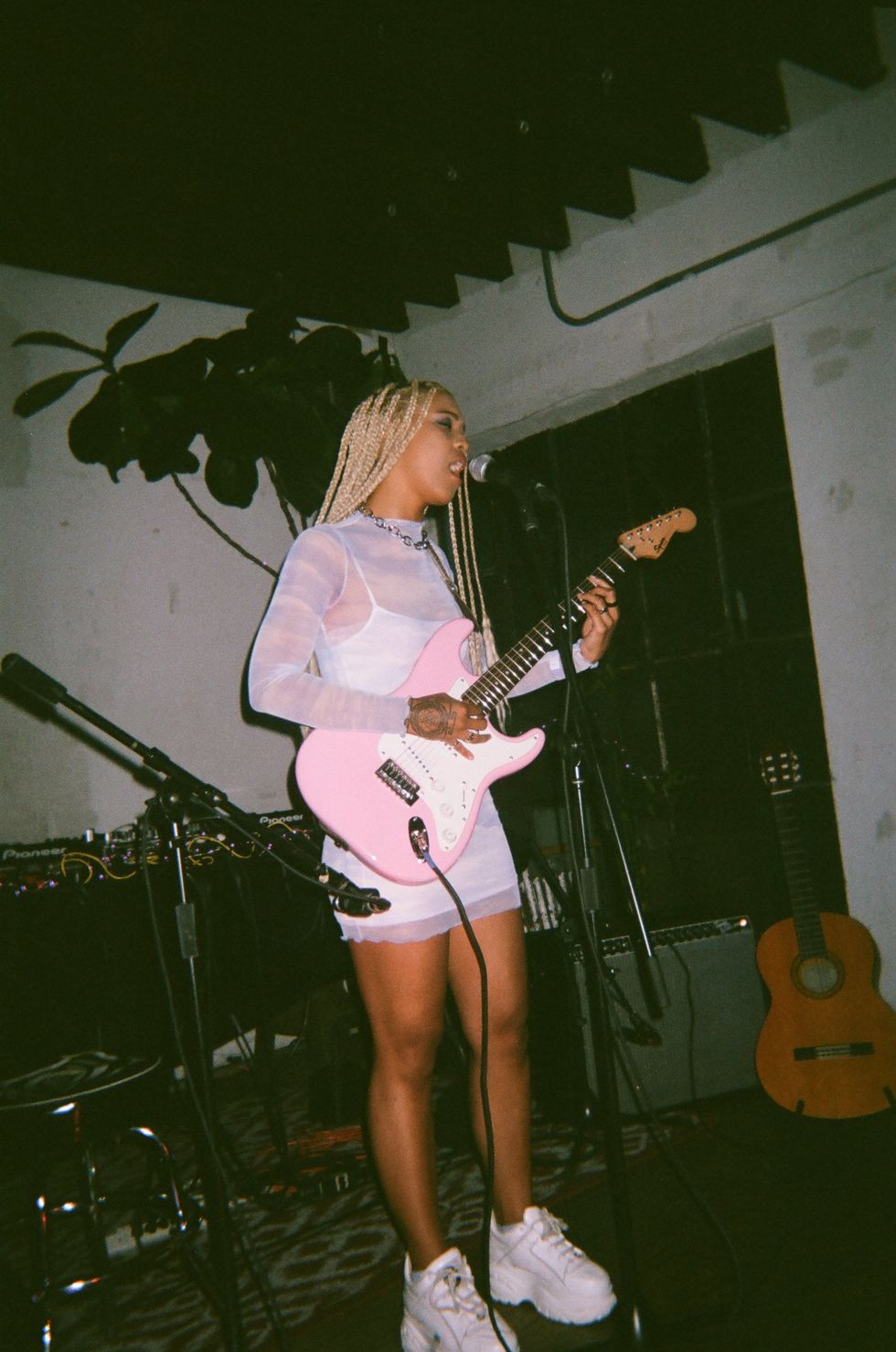
Simms: I think it's cool that everyone likes this stuff, but I want them to keep in mind that it isn't for them. Even at the start of SISTASPIN, it was always about having these spaces so we could have these events. I would have to go to a party and some fucking guy is trying to dance on me. (At a SISTASPIN party), I can just dance with my friends. People are not discriminated against at the door. It's always been about making those spaces and making them better than what we have seen. We're creating a space that's so niche to exactly what we're interested in, creating this movement and community that gives people confidence, and makes everyone feel like they're worthy. Their artistry and their talents are celebrated.
We DJ better. Honesty, Black women, femmes, LGBT+ people all DJ better. We have better music taste. It's more lit. Everyone dancing more. That's just a fact.
What do you think changes when it's a Black woman or Black femme? What changes about the atmosphere that makes it more comfortable?
Simms: I think it makes us comfortable, but makes other people uncomfortable, which is what we want.
Kayegi: People have a certain hesitation who don't share the identities that we're building the space for. Some people are uncomfortable coming into this space, and that's the same feeling we have going into any other space.
Simms: It's also shocks people. I had white women come up to me during SISTASPIN party like, "Oh my god. Who are you? We never see you?"
Bland: We exist. [laughs]
Black girls live in New York. [laughs]
Kayegi: I don't mind making a few people uncomfortable if it means everyone else is comfortable.
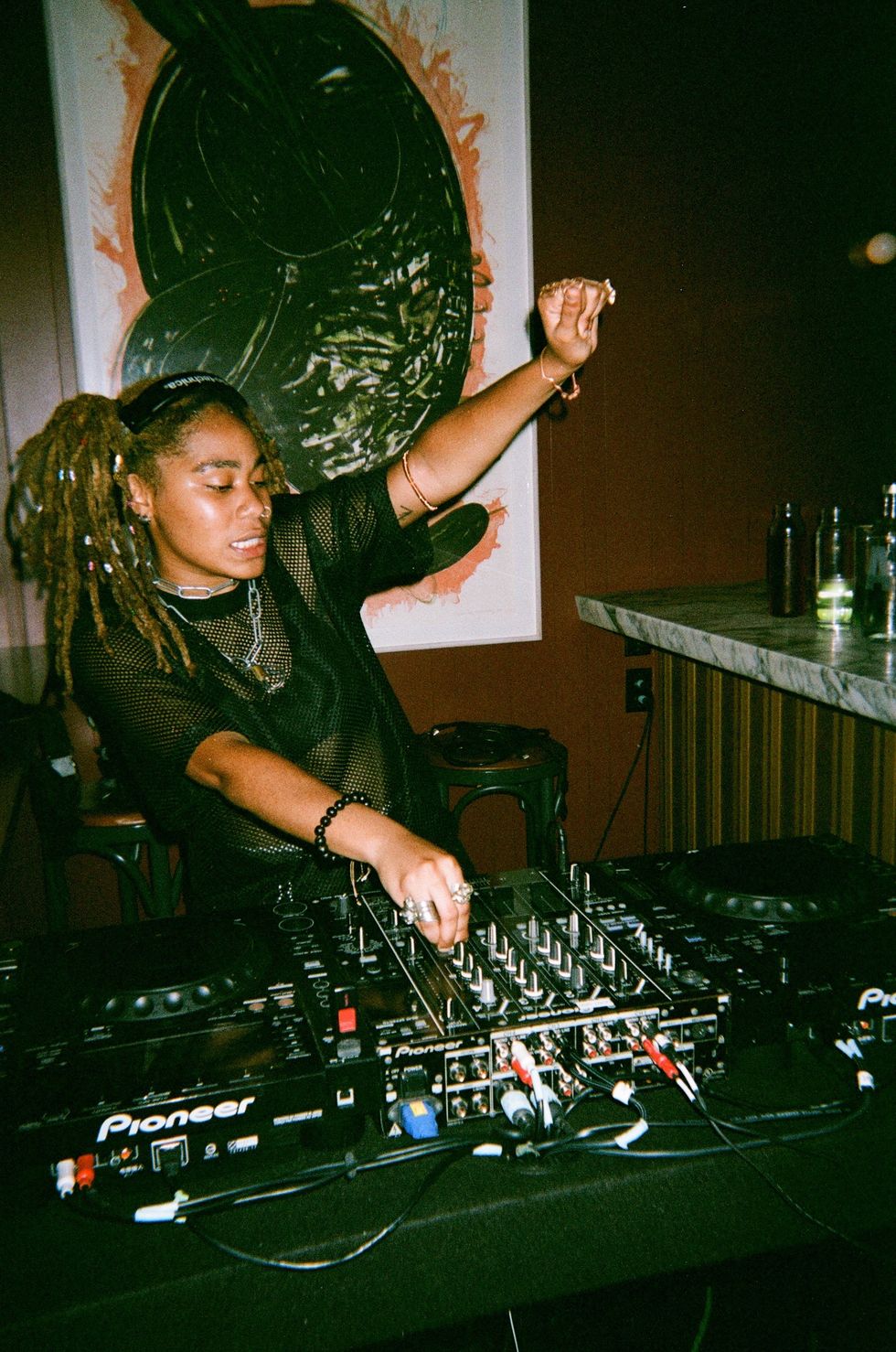
What do you see for SISTASPIN in the future? What do you want to do moving forward?
Kayegi: We're in a good space where we understand everything that is going on, but it's working towards having longevity to this. We've seen a lot of parties and things like this come and go.
Simms: But we want to come and stay.
Kayegi: What we are trying to do is get enough money to buy CDJs and get a studio space.
Bland: We want to get to a place where people can practice.
Kayegi: Being like, "You want to record a mix? You want to do something? You need the equipment? Here's the equipment."
Simms: We want to have a physical space that's a hangout space. A space of comfortability, but also a learning space. So, we want to have a studio so people can record. We want to have CDJs there. We want to have DJ equipment. We want to have lessons. We want to let people use the space for their own events if they want to. Anything.
Kayegi: Equipment is a huge barrier honestly for a lot of people.
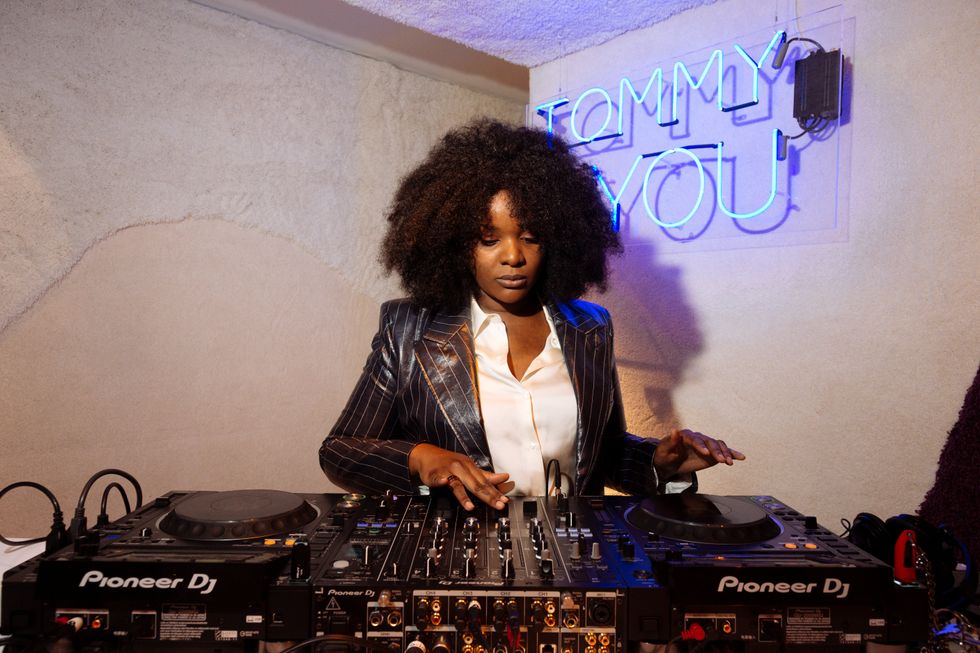
Simms: It's expensive as fuck.
Kayegi: If you don't know people that already DJ and you want to get into it, it's scary.
Bland: You can't do it.
Simms: I learned how to use a CDJ at Guitar Center, and I was battling little boys that are 13 and 14 at Union Square.
Kayegi: If we have the equipment then more people can explore that area.
Bland: But it's about being able to try and having the ability to do so. Also, we want SISTASPIN Festival.
Simms: We want to go global. We want to expand to Africa.
Bland: We want SISTASPIN Paris, London, Tokyo, Australia. Antarctica. [laughs]
Simms: We could go to the UK, Mái is British!
Kayegi: I'm not American. I came here for college. I grew up in Uganda and my mom is British. For me, I always thought this generally internationally as well. I thought of it as a model that we can change. Not just New York.
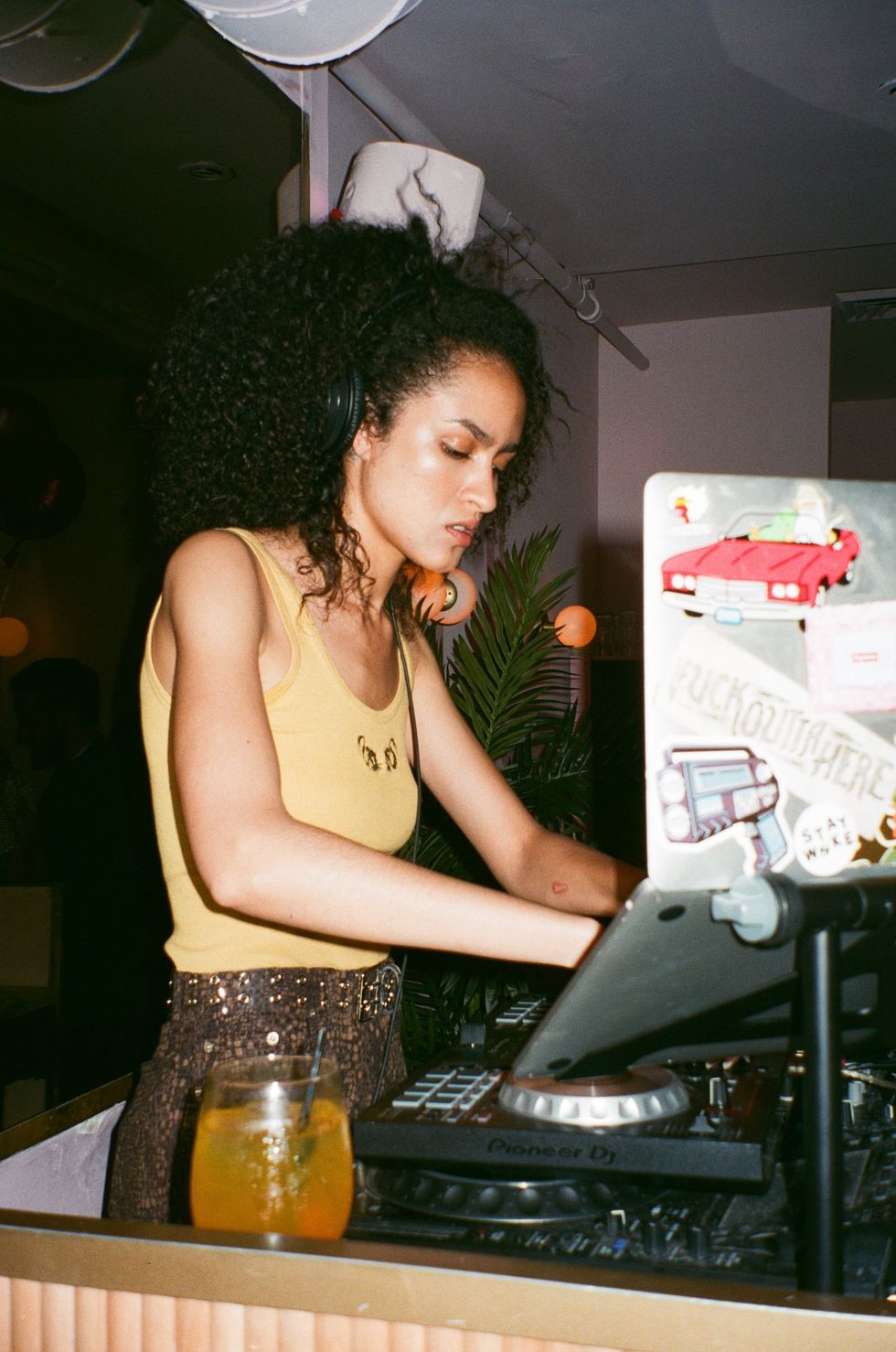
Simms: We're not thinking of this as an only New York thing. We want SISTASPIN to be everywhere. We want this to be happening everywhere.
Kayegi: I'm going to be between Europe and probably South Africa. We're all very interested in the expansive version.
Simms: But also looking at going to LA and having a DJ out there spearhead it and run things there.
Kayegi: Our focus, for now, is being able to create a model that works because it complicated to coordinate all this stuff and working for other people.
Simms: Also, what communities need in other cities. We know what it's like in this city, but what is it like when we go to other places. When we do bigger things, how can we get other people involved? That's our biggest thing, we want everyone to be involved.
Kayegi: I'd love to see a space like this in Kampala where I grew up, but it's slightly layered. It's a different situation because they have consideration of things like safety, but it can exist. It's just a question of trying to feel out how we want it to work. Everything's coming together in a very organic way. We don't want to feel contrived.
Photos courtesy SISTASPIN